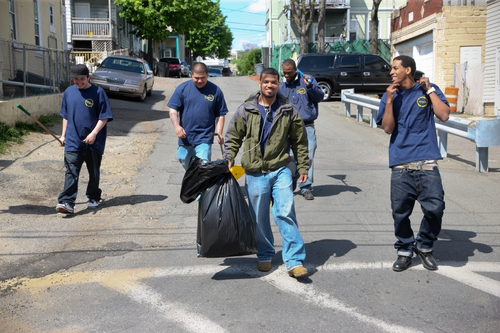Jun 23 2014 $27 million of intersector collaboration: Massachusetts’ social impact bond program
 The Massachusetts Juvenile Justice Pay for Success Initiative is an innovative and cost-effective approach in breaking the cycle of crime and incarceration for high-risk youth in the state. Launched in January of 2014, the Initiative demonstrates an unprecedented intersector collaboration of government services, public and private investments, and non-profit expertise. $27 million dollars — the largest “Pay for Success” contract in the country — has been allocated from the Commonwealth and private investors to the non-profit Roca, an organization with a track record of keeping high-risk young males out of prison by training them how to work and maintain employment.
The Massachusetts Juvenile Justice Pay for Success Initiative is an innovative and cost-effective approach in breaking the cycle of crime and incarceration for high-risk youth in the state. Launched in January of 2014, the Initiative demonstrates an unprecedented intersector collaboration of government services, public and private investments, and non-profit expertise. $27 million dollars — the largest “Pay for Success” contract in the country — has been allocated from the Commonwealth and private investors to the non-profit Roca, an organization with a track record of keeping high-risk young males out of prison by training them how to work and maintain employment.
The development of social impact bonds, also known as ‘pay-for-success bonds’ utilizes intersector collaboration because the design, implementation, and evaluation of the bond require the expertise and resources of each sector. The public sector typically attracts private capital to support the delivery or extension of a program that intends to create public value. The providers of capital are compensated with a return dependent on the quantity or quality of public benefit. The non-profit sector often operates the program, supported by the private capital, and works to achieve the greatest public benefit possible. Throughout the United States, this approach to cross-sector collaboration is increasingly popular with endorsements at the municipal, state and national levels.
The efforts of the Massachusetts Department of Youth Services are limited when young offenders turn 18 and “age out” of supportive social programs. The Office of the Commissioner of Probation is also limited in its ability to make a lasting positive impact once the probation period ends. In both cases, there is a subsequent vacuum in state programs and supervision, which has been a challenge in breaking the pattern of crime and incarceration.
Roca, however, is aiming to help. Founded in 1988, Roca — Spanish for “rock” — has improved the lives of over 18,000 people in the state through its outcomes-driven system of performance management and impact evaluation. Roca was selected for the seven-year Massachusetts Juvenile Pay for Success Initiative because of the non-profit’s unparalleled record of success in reducing incarceration rates and its capacity to provide long-term intervention and behavioral changes. The initiative only expands Roca’s outreach: 929 high-risk young males aged 17 to 23 who are either in probation or exiting the juvenile justice system will undergo Roca’s Intervention Model, a rigorous two-year cognitive-behavioral training program and two-year follow-up engagement.
The $27 million in this Pay for Success initiative comes from the Commonwealth of Massachusetts, with $11.7 million granted by the U.S. Department of Labor. Third Sector Capital Partners served as project intermediary for the other private and public sector investors, securing a total of $18 million in investments and grants. The Goldman Sachs Social Impact Fund loaned $9 million, and The Kesge Foundation and Living Cities each invested $1.5 million. The $6 million in grants stems from the Laura and John Arnold Foundation, New Profit, and The Boston Foundation.
The Pay for Success contract works like this: payments will be made between the second and seventh years of this initiative and based on the outcomes of these 929 young individuals. The target impact is a 40% decrease in the days of incarceration, which would amount to a gross savings of $22 million for the Commonwealth, equaling the cost of delivering services. There are also increased quarterly payments of $789 per participant who demonstrates job readiness through several meetings with Roca staff, and $750 per participant who lands and keeps a job.
If the target impact of a 40% decrease in prison days is reached, the investing parties of the Goldman Sachs Social Impact Fund will be repaid its principal of $9 million, plus a base annual interest rate of 5%. Likewise, The Kesge Foundation and Living Cities would be repaid their investments but at a 2% annual interest rate. Roca would receive $3.26 million and Third Sector Capital Partners $50,000 in the form of deferred service fees. If there were even fewer days of incarceration among the 929 participants, Roca and the lending partners would each receive additional compensation up to $1 million. On the other hand, if the rate of recidivism only decreases 5%, there would be no incarceration-based success payments, and the Commonwealth of Massachusetts would lose $0.9 million.
The Massachusetts Juvenile Justice Pay for Success Initiative is designed to not only improve life trajectories of high-risk young men in the state’s probation/juvenile justice systems but also reduce crime and save taxpayer dollars. The project exemplifies a cross-sector collaboration by deploying government agencies and private investments to a specialized non-profit organization that fosters a greater social outcome while at the same time saving public sector resources. If the Initiative surpasses expectations during its seven-year timespan, there is the potential for Roca to expand its program and positive impact on additional high-risk individuals in the state.
Visit www.rocainc.org for more information.
